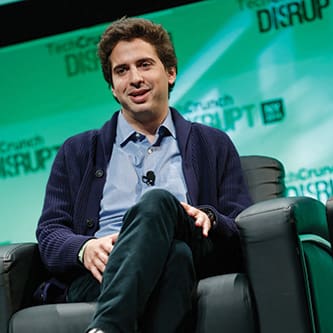Whisper, an anonymous app that allows users to post thoughts on everything from relationships and fears to pop culture and humor, seems to be growing in popularity with not only users – but also with advertisers.
While its competitor, Secret, shut down in April after building 15 million users and $35 million in venture capital, Whisper shows no signs of slowing down. CEO Michael Heyward recently hired Mark Troughton, a financial executive, as president and Shelby Huston Haro, an entertainment executive, as Whisper’s first vice president of sales.
What is Whisper?
Whisper is a free app that enables users to share short thoughts (often in just a sentence) anonymously with an online community. The app suggests artwork to go in the background from its library of stock images, or users can also upload their own images. People can search through and reply to Whispers by popularity, topic or location, and there’s a full-time team of staff moderators who look out for bullying or slanderous content.
The app boasts some pretty impressive stats: 10 million monthly users, 10 billion monthly pageviews and 1 million users every minute.
A USA Today article describes Whisper this way:
Instead of name calling, bullying, harassment, racist taunts and homophobic slander that has characterized some online comments without names attached, Whisper’s brand is a nice anonymity.
“What differentiates us from other platforms is that we only allow you to use anonymity as a shield and not as a sword,” says Michael Heyward, the 27-year-old co-founder and CEO of Whisper. Folks can’t use the app to “make fun of other people, to say bad things about others, only as a security blanket to protect yourself.”
How can brands use Whisper?
Whisper has already run ad campaigns for big brands, including Coca-Cola, Hulu and 20th Century Fox, and it has another one coming up for the Ad Council next month.
CEO Michael Heyward made it clear in an interview with Adweek that the app intends to expand its marketing efforts:
We have been working on some cool ad products for a while that never had a sales component. I think we are at a point where we’re being more proactive in [brand-related] conversations…
We tend to look at macro-based trends around places and topics. We can tell you more students talk about cheating on their exams at Cornell than any other university. Or we can tell you what [ZIP codes] have a lot of young people who think Donald Trump is interesting. But they may not be posting about it on Facebook because of whatever stigma there is.
Branded Whisper Campaigns
Coca-Cola
Coca-Cola recently ran its first promo ad on Whisper, asking users to post strategies to end cyberbullying. It only ran briefly but racked up 1,500 likes and 950 shares within a few hours of going live in the app’s Popular channel.
20th Century Fox
In April, Whisper partnered with 20th Century Fox to promote the studio’s remake of the horror movie “Poltergeist.”
Some ads were targeted by keyword to users who used terms such as “fear,” “dreams” and “ghosts.” They were then given the option to use a branded “Poltergeist” background in their posts; the backgrounds were used 15,000 times in the first 24 hours.
For another part of the campaign, “Poltergeist” posted the branded Whisper, “What keeps you up at night?” and received about 7,500 unique replies in the first few hours.
Whisper is still testing out new ways for brands to advertise, and we’re looking forward to seeing the creative opportunities that come from this evolution.

